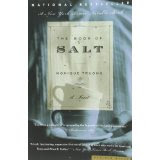
Dr Stephanie Dowrick reviews Monique Truong's
quite brilliantly imagined novel, The Book of Salt
How fortunate we are in this Book Club that we are not locked in to reviewing the "latest". Our freedom is to review what we are currently excited about and that certainly describes my response to Monique Truong's quite brilliantly imagined novel, The Book of Salt.
It was recommended to me some time ago by Walter Mason, my co-host here on this book club website, and I bought it immediately but then let it sit for some time on my shelves until I was traveling and could give it the attention he assured me it would deserve. And it does! Oh, indeed it does. The novel is enchanting and immensely skillful. It evokes a most fascinating time (Paris in the 1930s) with strongly evocative glimpses back to a Vietnam occupied by the French where our narrator, Binh (though that is not his real name), was never going to fit.
 |
| 1930s Vietnam |
Many readers will be attracted to this novel to know more about the quite fascinating Stein and Toklas. They will get that in plenty. And they will be given and will "get" the uneasy decade that preceded the "impossible" Second World War. But what few readers will predict is the pitch-perfect portrait of Binh. Servants - like Binh - are valued, but always conditionally and highly superficially. If their work is not "up to scratch", they cease to exist as valued people. The images of exile flow through this novel like incoming tides. Binh is homosexual (long before anyone was "gay"). The risks of this, especially for an "Asiatique" who was neither wealthy nor valued for anything but his culinary talents, made him almost as vulnerable in Paris as he has been in Vietnam.
Truong writes like a poet but tells stories like a master. She never lets the reader go; she never abandons or sentimentalises Binh. In an interview a few years ago she was asked about how she builds character. Her reply:
I begin with a character who fascinates me. I focus first on that character’s voice. Reading aloud is a large part of my writing process because I want to “hear” my characters. So far, I’ve written novels only in the first person voice. I don’t see that changing. I like the limitations of the first person voice. I like working within the restrictions of a particular character’s vocabulary and emotional range or lack thereof. I’m also a firm believer that for every story there are many other versions of that story that are not being told. The first person voice, for me, is all about highlighting that sharing and withholding.
The story of Binh that Truong tells - no, brings fully to life - is a story rarely told. The creative playfulness of pitching this next to the story of Stein and Toklas - over-feted, over-valued, at least in literary terms - takes nothing from the seriousness of this writer's intent, nor from the immense satisfaction of reading her exquisite novel. The blurb for The Book of Salt also draws our attention to the walk-on roles of Paul Robeson and the very young Ho Chi Minh. But it's the life that Truong gives to the invisible Binh and to all the countless and uncounted other Binhs that moved me most. Brilliant? Yes.
Dr Stephanie Dowrick co-hosts this book club and is herself a widely published writer. Please consider using our book store links to give a small returning % to us for admin. (All our reviews are voluntary.) The direct link for this book is HERE. Your comments are welcome. You can find Stephanie and also Walter Mason on Facebook. They also both blog on their own websites and contribute widely to the media.





No comments:
Post a Comment